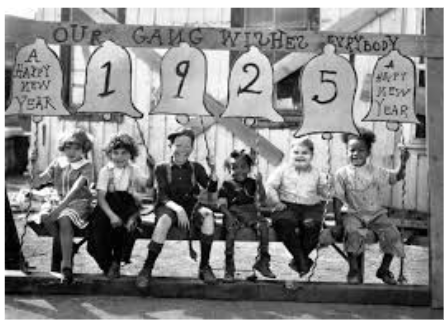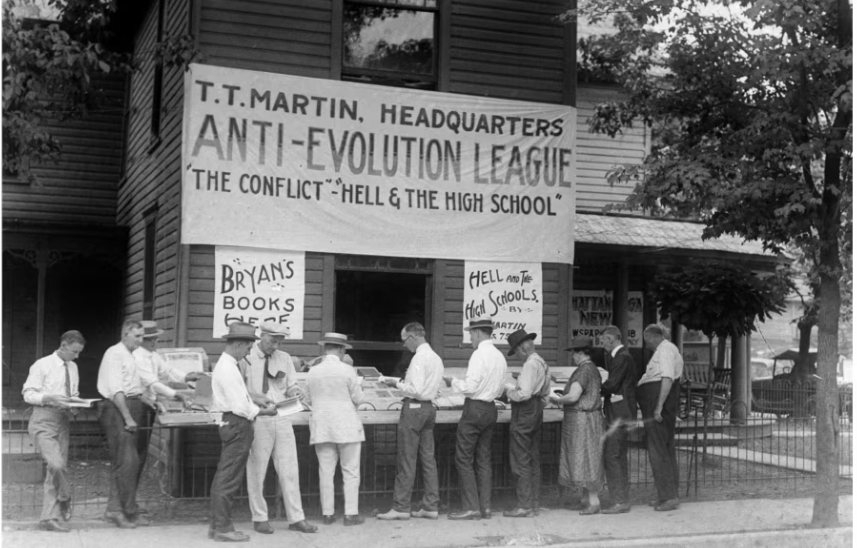It is a cold, grey, slushy day here in Vermont. I had to text Marshall to find out if I was supposed to be writing another blog—Is this my week? Apparently it is.
Out of curiosity, I decided to look up the significant events of 1925, just 100 years ago come January 1. It is a mixed message that is for sure. In 1925 the big news items were the Scopes Trial prosecution, the rise of Mussolini as the fascist of choice for Italy, Hitler’s Mein Kampf as a top seller, Fitzgerald’s The Great Gatsby, Charlie Chaplin’s The Gold Rush, and Louis Armstrong bursting on the music scene with his band The High Fives.
It is instructive to think about these events. The Scopes Trial may not be an immediate dinner table topic, but in light of current efforts to rewrite history and control curriculum, it is worth taking a second look. A young science teacher, John Thomas Scopes (in collaboration with local businessman George Rappelya) was accused of teaching evolution in defiance of a Tennessee law. It was passed in March of 1925 and made it a misdemeanor to “teach any theory that denies the story of the Divine Creation of man as taught in the Bible, and to teach instead that man has descended from a lower order of animals.”
The Monkey Trials, as they became known, were sensationalized by the carnival-like atmosphere in Dayton, Tennessee, where the trial took place. They also showcased the legal prowess of William Jennings Bryant, Clarence Darrow, and the ACLU. The prosecution won; Scopes paid his $100 fine and went on to become a geologist. To win, Clarence Darrow simply humiliated the fundamentalist and storied William Jennings Bryant by calling him as a witness, where it became laughably apparent he knew almost nothing about science and was additionally relying on an uneven knowledge of scripture. In the long run, Darwin’s theory of evolution prevailed, but the law that Scopes broke was not overturned until 1968. Changing minds that hold an unshakable belief regardless of fact was and continues to be a hard sell.
Oddly, in 1925, we saw the rise of Mussolini and Hitler—two of the most notable fascists of all time. Mein Kampf (or “my struggle”) was Hitler’s manifesto, outlining his plans for Germany.
There is a fascinating article in the Tampa Bay Times August 13 1941 pg 6 entitled “What Mein Kampf means to us.” In it, Francis Hackett offers an insightful and clear-eyed view on how Hitler and for that matter Mussolini came to power. “All through Mein Kampf, Hitler drives a wedge in the ranks of democracy by raising the issue of communism. Thus he misleads a vast majority of Americans who detest the Russian ideology. Since Russia is the real enemy to them, they are half reconciled to Hitler’s possible triumph in Europe. Others are less clear but think it is a waste of time to discuss Hitler’s view on life or his war aims or his mission.” The article goes on to articulate how American business was complicit. Alll we had to do was arm America to the teeth and the world order that favors us was all set.
The Great Gatsby is the quintessential story of the Jazz Age. Published in 1925, it was not an immediate best seller. In fact, it did not become popular until WWII when copies of the book were handed out to soldiers serving overseas. Up until recently, it was a staple of the high school literature classes.
What The Great Gatsby does offer us, even now, is a look at the social norms of class, wealth (inherited and made), love, and the quixotic nature of the American Dream during the Jazz Age. It was a time of moral permissiveness when Americans became disillusioned with the old ways and became obsessed with the pursuit of pleasure. Fitzgerald, much like Gatsby, sought out a life in high society while at the same time was ambivalent if not mildly disdainful of what it had to offer. His was an uneasy balance between admiration of the hugely rich and a resentment towards them.
Charlie Chaplin’s Little Tramp character is another theme from the Jazz Age that still appeals. The Little Tramp, ostensibly a vagrant, is really a clever man that often outwits his formidable opponents by appearing to be an affable dummy but is exactly the opposite. Chaplin plays the character as an outsider who thwarts authorities and gets precisely what he wants. He looks ridiculous with his big shoes and baggy pants. In the early years, the character of the Little Tramp was an “anti-authoritarian pleasure seeking flirt” (Hutchinson, Charlie Chaplin and the Tramp: the Birth of a Hero. The Guardian Jan 27 2014). Once again we are presented with the clever underdog that flourishes in spite of the system.
2025 will be here in a flash and with it a very different political, moral and cultural landscape from the present. One that, it is safe to say, will pose challenges on all levels from the classroom to the boardroom, from the backyard garden to the supermarket.
I will not pretend to be a political scientist or have any insights into how we as a nation got to where we are at this juncture. I also failed the “Crystal Ball 101 “ exam several times but I do think we can learn some valuable lessons from the last hundred years. My mom died at 102 and one of her abiding comments was, “Do you have any idea what I have seen? I was born the year after women got the vote!”
I wonder what her advice might be on this New Year’s Eve.
-Bird Jones





